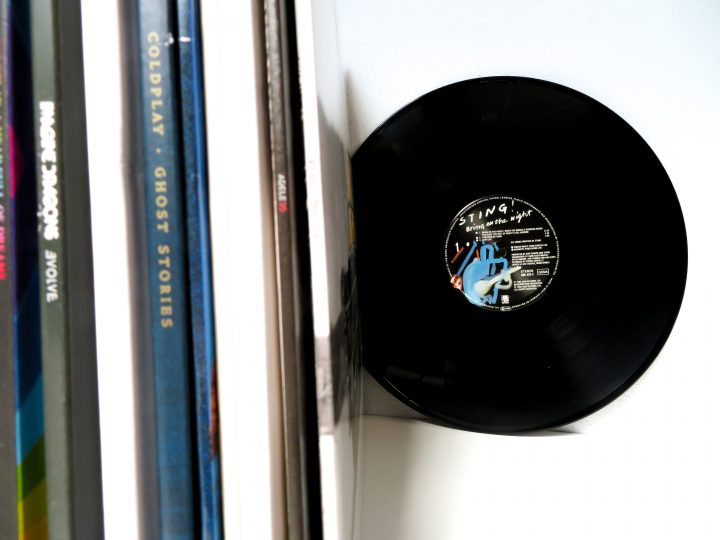What is a 180 gram vinyl? Does it, as every audiophile seems to suggest, actually sound better? If not, what benefits are there besides the supposedly better sound quality?
All this and more today as we explore the various benefits of using 180 gram vinyl over other, thinner varieties of vinyl records.

What is a 180 gram Vinyl?
The term 180-gram vinyl takes its meaning from the process by which vinyl records are manufactured. In essence, a vinyl record that is 180 grams or higher is simply heavier than other records.
This has, however, become more and more common in vinyl production. Certain manufacturers began the trend not long after the beginning of the vinyl revival. Not wanting to be left in the dust, other manufacturers soon took up this same trend, and now it is quite the norm for a new record to be manufactured at this thickness.
There really is no limit for record weight. Sure, 180 grams might be incredibly heavy as it is, but some pressings have been known to go up to 200 grams or even more.
The norm has so often been to produce records of thicknesses between 120 grams and 150 grams. This has been one of the central precedents that followed the vinyl manufacturing industry since its inception – or at least since they started using polyvinyl chloride and producing 12-inch vinyl record types to be played at 33 1/3 rpm.
The kind of heavyweight vinyl that is produced today must surely have a knock-on effect on some of the other parts of a turntable, right? Indeed, they do, though it does not feel like manufacturers have paid this much mind, certainly not more mind than the notion of simply making more and more, even when pressing plants can’t keep up as it is.
But why? How is a 180 gram vinyl record different from any other record? Records have been manufactured for decades in slimmer purities and less heavy weights; why should we take this 180 gram record seriously?
Does 180 gram Vinyl Sound Better?
This is something that many an audiophile would rush to the defence of without a moment of hesitation. Such an audiophile might indeed testify in a court of law that, yes, a 180 gram vinyl record boasts a sound quality improved enough to warrant screaming about it in every which forum.
The argument goes a little something like this. If a record weighs more and is, thus, more thick as a result, then there is more room for the grooves to deepen and, therefore, more space for detail. A convincing argument, sure, until you actually inform yourself about the proper procedure when it comes to manufacturing records at the factory level.
In reality, the standards for cutting grooves are exactly the same for all records, regardless of the thickness of the records thence produced. The cutting of the grooves is, in fact, determined far before this part of the process. Thus, it really has no bearing whatsoever.
Therefore, the weight of a vinyl record is officially believed to have little to no impact on the sound quality. The grooves and the way they are cut are actually figured out and enacted at the mastering stage, not the cutting stage, so this should prove it.
Technically, because the grooves normally cut into a piece of vinyl are so small, you could print this vibrational data into a disc of 100 grams or even lower. Of course, this disc would be incredibly thin, flimsy, and bendy, but it would still technically work.
So, hopefully, we can see just how important the mastering stage of the process is, especially compared to the cutting process. This latter part would be rendered useless if the release in question was not mastered in such a way as to be cut properly. The mastering stage of vinyl production is incredibly different from other mediums.
What is a 180 gram Vinyl Good For, then?
Well, you might be asking, if thicker records do not sound better, what are they good for? What is a supposedly ultra-high quality record like doing on the shelves?
Durability
Well, for one thing, 180 gram vinyl is more durable than other vinyl releases of a thinner persuasion. This is the most obvious reason people might opt to use 180 gram vinyl instead of any thinner varieties. Of course, as we have seen, this does not totally equate to a better sound, but will instead mean that the release will last a lot longer.
This is due to the fact that it will be more durable, more resistance to breakage and warping over time. This, however, is not to say that the grooves will last longer, quite the opposite in fact.
Wow & Flutter
It is the belief of some pressing plants that thicker records can help reduce the wow and flutter that many have resided themselves to feeling are part of the vinyl listening experience.
By playing on the vertical tracking angle, it is believed that a thicker record, like a 180 gram record will enable the platter to move at a more constant speed.
This is all well and good for more expensive turntables, but the opposite has actually been shown to be true, that heavier records do not mean better sound quality. Rather, heavier vinyl weight can lead to extra pressure and friction on the platter which can then damage the resulting sound and the record grooves.
Better Isolation
One of the main things that have been known to plague users during their vinyl experience is the effect of external vibrations on the listening experience. Often, even small vibrations can have a considerable effect on the way a record sounds, more dramatic ones sending the needle spinning out of control.
Thicker records are supposed to be good for these kinds of issues, providing a thicker isolation to protect the stylus against this kind of vibrational interference. Of course, you could alternatively just use an acrylic platter mat or a cork slip mat, both of which have been known to help with issues of this kind.
Feeling
Though this is open to personal preference, many a record collector believes that heavier records simply feel better, their added weight more comforting to the touch.
Final Tones
So, there you have it! Hopefully, you are feeling a little more clued up on just what makes 180 gram vinyl so special.
FAQs What is a 180 Gram Vinyl?
Are 180g vinyls better?
There are plenty of audiophiles that would have you believe that this is the case, but is it actually? Sure, there are some benefits that would make you choose a 180 gram vinyl record over lighter records. The added weight means more density which, in turn, means that such a record is better at absorbing the kind of external vibrations that have been known to entirely ruin a listening experience on vinyl. In terms of the actual quality of the sound imbibed within the grooves of the record, facts will tell you that it is all in the mastering process, the veritable thickness of a record having little to nothing to do with the quality of the end product.
What does the gram of a vinyl mean?
Much as in the real world, the grams of vinyl simply pertains to the weight of the record. There is a widespread belief amongst many audiophiles that the heavier a record is, the better it will sound. While there are certainly benefits for using heavier vinyl – the increased density resulting in greater absorption of external vibrations, etc – the benefits do not extend to the actual quality of the music in the grooves. This is determined at the mastering stage and has nothing to do with the thickness, no matter how much a thicker record might improve a record’s durability.
What is 180 gram audiophile vinyl?
Vinyl, like all other material things, has a certain weight. There is, however, a certain belief among audiophiles that the heavier a record is, the better the resulting sound is. True enough, there are certain benefits to using thicker and heavier records, such as better isolation from external vibrations and, overall, an increased durability. However, this has no bearing on the quality of the sound pressed into the grooves, something that is determined at the mastering stage of the process.
What speed is 180 gram vinyl?
Just as with any 12-inch record, a 12-inch record that weighs 180 grams or more can be played at any speed amongst the three main speeds – 33 1/3, 45, and 78 rpm. A 12-inch single might be played at 45 rpm while a long playing record pressed onto 12-inch 180 gram vinyl might, instead, be played at 33 1/3 rpm to ensure that there is more space on each side.





